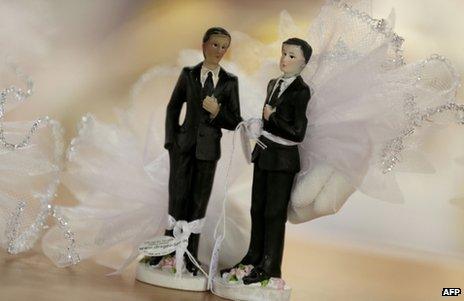Putin rejects foreign adoptions by same-sex couples
- Published

France is poised to enact same-sex marriage and adoption
Russian President Vladimir Putin has said Moscow should amend its adoption agreements with countries which have legalised gay marriage.
Asked about the legalisation of same-sex marriage and adoption in France, he said other countries should respect Russia's "moral standards".
French President Francois Hollande is expected to sign the bill into law after it was passed by parliament.
Moscow has also linked adoptions to a US black list of its officials.
It has emerged that Russia warned the Irish Republic last month that it could stop the adoption of Russian children by Irish parents if the parliament in Dublin endorsed the Magnitsky Act, external.
The act places sanctions on 18 Russians allegedly involved in the death of anti-corruption whistleblower Sergei Magnitsky in a Russian prison in 2009.
Russia banned Americans from adopting Russian children soon after the US Congress passed the legislation in December.
MPs in several EU countries, including the Irish Republic, are considering following the American example.
'Quite correct'
At a meeting between lawmakers and Mr Putin in Moscow, Marina Orgeyeva, speaker of the regional assembly in Kaliningrad, suggested making changes to adoption agreements with France to ensure that Russian children were not adopted by same-sex parents.
"I consider it quite correct to make changes to the appropriate documents," Mr Putin replied.
"It is a current issue and we need to think about it. We respect our partners but ask them to respect Russia's cultural traditions and ethical, legal and moral standards."
Russia decriminalised homosexuality in 1993 and officially removed it from a list of psychiatric disorders in 1999.
However, demonstrations by gay rights activists have been banned and a bill outlawing "homosexual propaganda" is currently before parliament in Moscow.
In France itself, the same-sex bill has divided society. Opponents have held several mass demonstrations in Paris, some of which have seen protesters clashing with police.
'Spectacular attack'
A letter from the Russian ambassador to Dublin, Maxim Peshkov, to the foreign affairs committee of the Oireachtas (the Irish houses of parliament) on 11 March has been published by the EU Observer news website, external.
In it, the embassy warns that the passing of the Magnitsky Act could "have negative influence on the negotiations on the adoption agreement between Russia and Ireland being proceeded".
US businessman William Browder, Magnitsky's employer and the driving force behind the sanctions, criticised the Russian attempt to block the act.
"If this goes ahead it would be a spectacular attack on Irish democracy," Mr Browder told The Irish Times, external. "It would be a sad day for Irish democracy."
Pat Breen, chairman of the foreign affairs committee, said the committee would not be influenced by anybody and he hoped for consensus.
Guy Verhofstadt, leader of the liberal group (ALDE) in the European Parliament, condemned the Russian letter.
"Russian foreign policy once again is showing its ugly face," he said in a press release.
"Blackmailing used by the Russian authorities against Ireland is unacceptable and must be met by a solid and united EU stand."
Mr Verhofstadt also called for the Magnitsky Act to be passed across the EU.
- Published11 July 2013
- Published27 February 2013
- Published11 January 2013